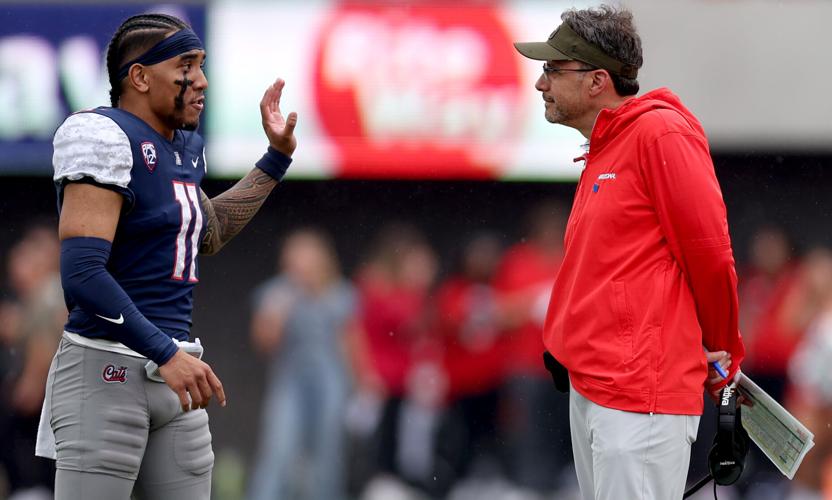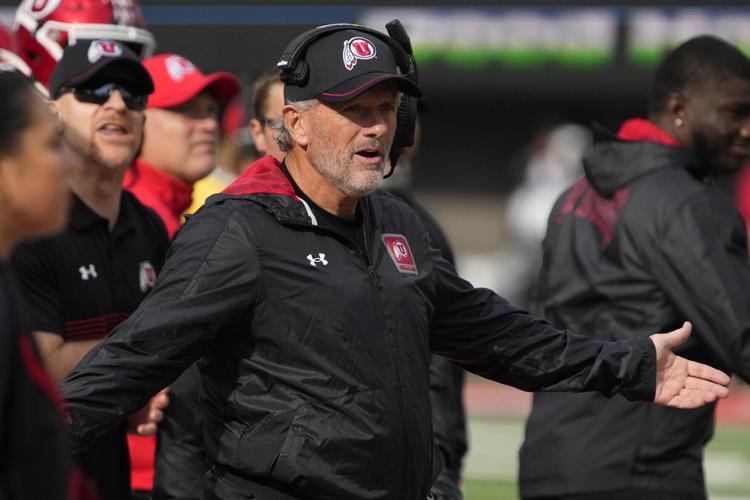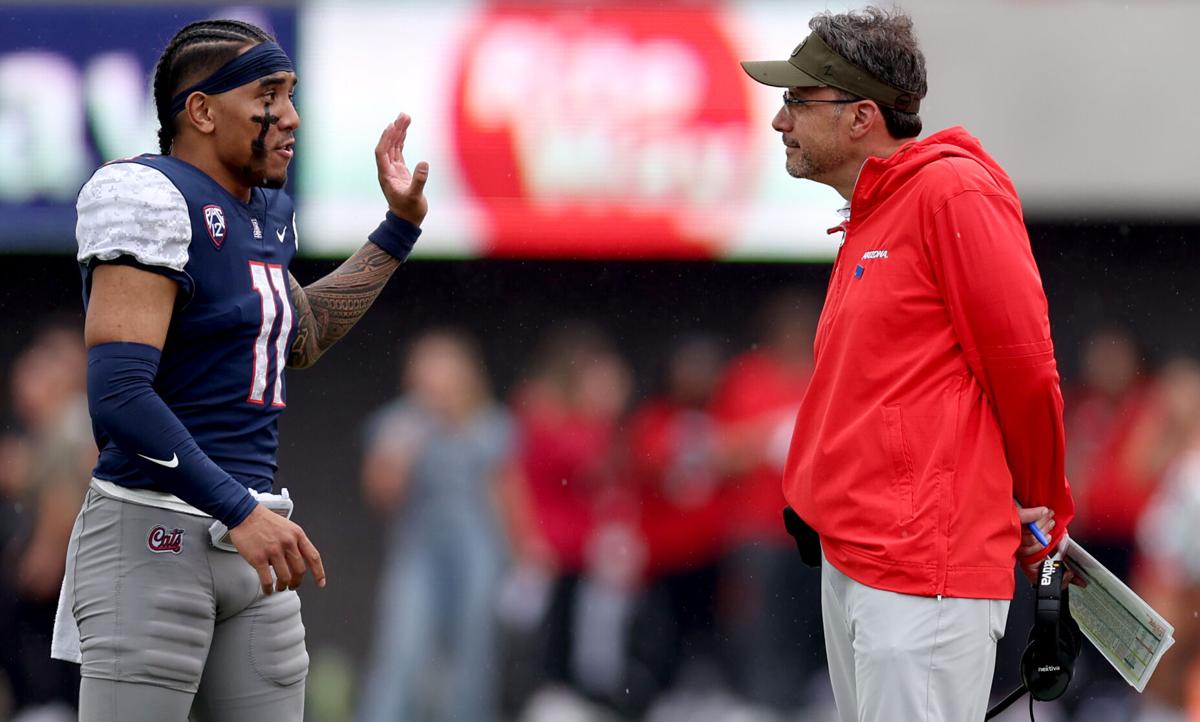Arizona led Utah 28-0 early Saturday afternoon, something unexpectedly lopsided, when a rainstorm engulfed the Tucson valley, obscuring the Catalina mountains.
But that didn't matter to Jedd Fisch's racy football team or the 50,800 fans at Arizona Stadium. On a day the Wildcats beat their fourth Top 25 opponent this season, 42-18, the view went beyond the clouds and all the way to football heaven.

is the longtime sports columnist for the
Arizona Daily Starand
Tucson.com.
It was sort of like the scene from "Field of Dreams,'' when an old baseball player walked out of an Iowa cornfield and said, "maybe this is heaven."
This is as close to football heaven as Arizona has gotten for 25 years, since the UA's historic 12-1 club of 1998. In three short years, Fisch has proved that if he builds it, they will come — they will win.
Even on a rare rainy afternoon in Tucson; even against Utah, the league's ranking heavyweight of recent years.
"It all happened in the blink of an eye,'' Utah coach Kyle Whittingham said. "We've got to accept the fact they outplayed us and outcoached us.''

Utah head coach Kyle Whittingham reacts to a call against Arizona during the second half of the Wildcats' 42-18 win over the Utes on Nov. 18, 2023, at Arizona Stadium.
Some of this doesn't make much (football) sense. Arizona is 8-3. Had it been 3-8, few in the football community, here or elsewhere, would've raised an eyebrow.
But Fisch surely saw this coming even if no one else did.
"In training camp this year, I told (athletic director) Dave Heeke and I told our president (Robert Robbins) that I just felt we were good,'' Fisch said after Saturday's game.
"We won't back down to anybody.''
If you examine the history of Arizona football dating to the Pop McKale days a century ago, Fisch had the worst coaching record after his first 32 games in Tucson, 12-20. Dead last.
Of the 11 other UA football coaches to make it to 32 games — John Mackovic and Kevin Sumlin didn't — no one had a more frustrating start than Fisch's 12-20.
McKale went 22-10. Jim LaRue was 20-10-2. Jim Young 25-7. Dick Tomey 17-12-3. Even Mike Stoops, who faced a rebuilding job to match what Fisch inherited, went 13-19.
I tell you this because it defines the type of results-driven work, the day-to-day labor Fisch has done when few outside of the Lowell-Stevens Football Facility thought it was possible. He is now 14-21 as a head coach, a record that usually puts you on the hot-seat watch, but it's altogether possible that Fisch has become the most appealing coach on any athletic director's coaching search.
Those 50,800 who sat through the rain Saturday would surely shout ''DON'T GO'' to Fisch today. PLEASE DON'T GO.
On Wednesday, Fisch agreed to a 20-minute interview with former UCLA, Washington and Colorado head coach Rick Neuheisel on Sirius-XM. Neuheisel and Fisch go way back; they were coaching companions on the Baltimore Ravens 2006 and 2007 staffs — Neiheisel was the then-young (mid-30s) Fisch's boss — and ultimately, Neuheisel asked Fisch about the job market.

The Wildcat defense surrounds Utah running back Ja'Quinden Jackson (3) during Arizona’s 42-18 win Saturday at Arizona Stadium. The game was the last Pac-12 conference matchup ever at Arizona Stadium.
Fisch said he's not interested and not looking.
"I couldn't do that to my wife, Amber. She has made 12 moves with me,'' he said with a laugh. He then got serious and said "I am committed to the kids here like they have committed to me. I want to see this come to fruition and watch it play out.''
He completed the interview by telling Neuheisel, "I tell our kids we want to be like Utah, physical and tough, and have an edge to us.''
It was as if he described Saturday's game 72 hours in advance. He left out smart.
Fisch's play-calling was so effective in the first quarter that Utah was on its heels, down 28-0 almost before the first hot dog was consumed at Arizona Stadium. That's a skill he absorbed while learning under Neuheisel and at NFL coaching stops with the Seahawks, Jaguars, Rams, Vikings, Broncos and Patriots.
If he's not the best offensive player caller at Arizona since the great Homer Smith a quarter-century ago, who is?
Utah linebacker Levani Damuni said that the UA's early screen passes, leading to two touchdowns, "were just good play calls; they had numbers on us outside. They were very physical.''
Out-coaching Utah is about the most unexpected element in Pac-12 football. After the game, Fisch referred to Whittingham as "one of the best coaches ever to coach college football.''
It's not an accident.
Whittingham has surrounded himself with two of the most admired coordinators in college football. Defensive coordinator Morgan Scalley, who is paid $1.5 million per year, double the salary of Arizona coordinator Johnny Nansen, is in his 16th year at Utah. He is a force.
Utah offensive coordinator Andy Ludwig, who is paid $1.55 million per year, more than double the $725,000 Arizona pays coordinator Brennan Carroll, is in his third stint with the Utes, part of the Whittingham family of coaches which also includes 10th-year coach Jim Harding, ninth-year coach Lewis Powell, 12th-year coach Sharrieff Shah, and, just as important as any coach,17th-year strength and conditioning coach Doug Elisaia.
Much of the reason Fisch has been able to jump from 1-11 to 8-3 in two seasons is because he follows the lead of Whittingham, who places a premium on stability, continuity and surrounding himself with high-level assistants.
You could make a strong case that the UA defensive staff is No, 1 in the Pac-12 this year, benefiting from 93 years of college coaching from Nansen, Duane Akina, Chuck Cecil, Ricky Hunley and Jason Kafusi.
How else do you survive six games against Top-25 opponents and win four of them? It starts with coaching.
Only one team in UA history, Tomey's 1989 club that beat No. 6 Oklahoma, No. 11 Washington, No.22 UCLA and No. 15 Washington State can match it.
But the ’89 team stumbled in Game 9, losing 29-28 when injuries forced Tomey to play safety Jeff Hammerschmidt at quarterback, before routing ASU in the Territorial Cup.
Arizona's QB situation is in a much better place today. Freshman Noah Fifita again played winning football on Saturday. He impressed Whittingham.
"Their quarterback was very sharp, very poised,'' Whittingham said. "He handles himself well.''
Whittingham could've been speaking about the entire UA team, its program and its coaching staff. Sharp, poised, winners.
A little piece of football heaven.








